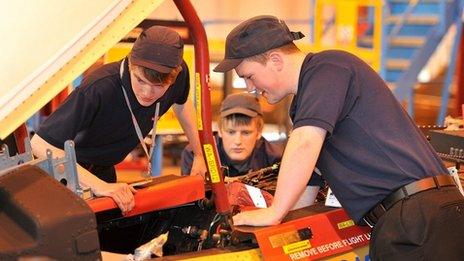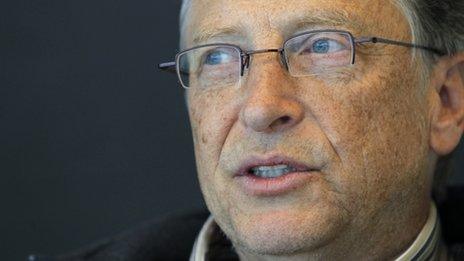Teenagers' 'mismatched' job ambitions
- Published

The survey highlights the gap between job ambitions and a tougher reality
There is a "massive mismatch" between young people's career expectations and the reality of the jobs available, a major survey of teenagers suggests.
It highlights the need for better careers advice, says Nick Chambers, director of the Education and Employers Taskforce, which published the survey.
The study also indicates teenagers have a very weak understanding of potential earnings for different types of jobs.
There is a serious "information gap" for teenagers, says Mr Chambers.
Confederation of British Industry president Sir Roger Carr said the report showed industry had to do more to show young people the "requirements and opportunities" of the world of work.
Missing qualifications
The study, based on a survey of 11,000 13- to 16-year-olds, is an attempt to map the job ambitions of teenagers against the employment market up to 2020.
It shows teenagers have a weak grasp of the availability of jobs - and that large numbers will be aiming for jobs that are in short supply.
For instance, there are 10 times as many people aiming for jobs in the culture, media and sports sector than there are jobs likely to be available.
And even though almost a quarter of jobs are in the distribution, hotels and restaurant category, only about one in 40 youngsters are considering careers in these industries.
Fewer than one in 30 young people are considering jobs in banking and finance, even though one in five jobs are expected to be in this sector.
This "misalignment" could mean long-term problems for young people, the report says, because they are making decisions about qualifications and subjects with little awareness of the jobs market ahead of them.
And the report warns it can be difficult in later years to catch up with missing qualifications.
This lack of informed choices fuels the problem of employers struggling to find suitably skilled staff, even though there are high levels of youth unemployment.
Lack of advice
The report also looks at the perceptions of young people about types of employment.
Among the 10 least preferred occupations are jobs such as surveyor and speech therapist, even though they are likely to earn above-average pay.
The two least preferred jobs, as identified by teenagers, are factory work and glaziers.
The most preferred employment areas, from the perspective of teenagers, include teaching, the law, the police, psychology and sport.
These might be influenced either by role models such as teachers at school - or else by media images.
But the report says it suggests the narrowness of young people's view of the types of work available - and the failure of employers to present a broader picture of opportunities.
This is the latest warning about the need to improve careers education.
MPs on the education select committee earlier this year warned that careers services in England showed a "worrying deterioration" and called for urgent action.
It warned that the National Careers Service, launched last year, offered guidance by website and phone, but did not provide young people with face-to-face advisers.
Association of School and College Leaders general secretary Brian Lightman said the report showed the importance of "ensuring that all young people are properly informed about the range of career routes open to them".
"It also underlines the need for a nationally co-ordinated careers service which ensures that young people anywhere in the country are able to access face to face guidance by a qualified careers professional," said Mr Lightman.
Deloitte chairman David Cruickshank said there was a recognition of the need to forge relationships between schools and employers. "Both sides are willing, but for too many, partnership has felt too difficult," he said.
Education and Employers Taskforce director Nick Chambers said: "As a country we are doing our young people a huge disservice if we don't give them enough information to allow then to make proper informed decisions about their futures."
This charity has campaigned to improve the quality of careers education, highlighting the link between social mobility and access to career advice and work experience.
It runs Inspiring the Future and launched Speakers for Schools, projects which encourage people from different professions to visit state schools and talk about their jobs.
Among the most prominent Speakers for Schools was software billionaire Bill Gates, who visited a secondary school in south London.
- Published23 January 2013

- Published23 November 2012

- Published25 January 2012

- Published5 April 2012
- Published2 July 2012
